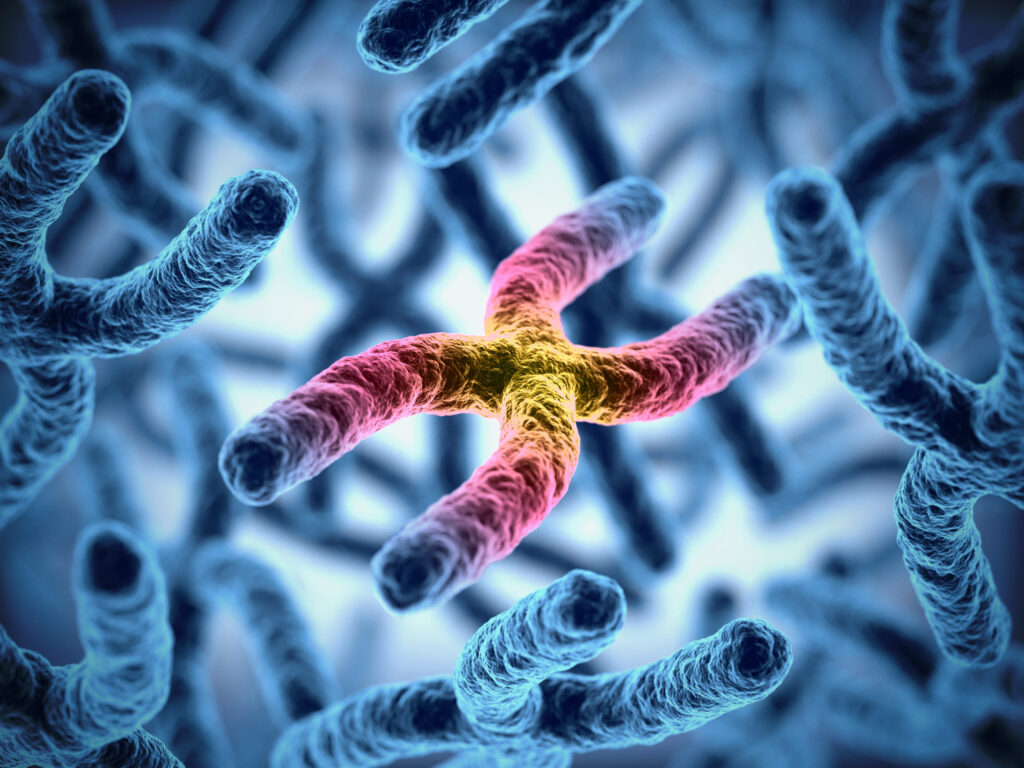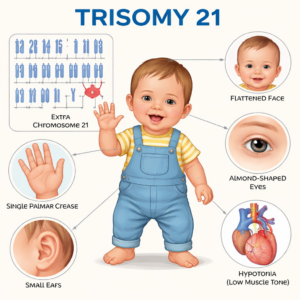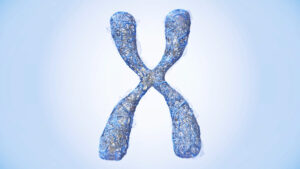What is X-linked inheritance?
X-linked inheritance means that a gene mutation occurs on the sex chromosomes.
Females have two X sex chromosomes, males have one X and one Y sex chromosome.
There are two main types of X-linked inheritance.
X-linked recessive inheritance
A gene mutation inherited in an X-linked recessive pattern is located on the X chromosome. Because of the fact that males have only one X chromosome, they will always be affected by rare diseases inherited according to this pattern. Females with two X chromosomes will generally be just carriers for the genetic mutation, and show no-limited, or very mild symptoms.
There are three main considerations when it comes to X-linked recessive inheritance and the disorders they cause:
- Fathers can not pass X-linked recessive gene mutations onto their sons. This is because fathers pass the Y chromosome on to their sons. The X chromosome, including any gene mutation on it, is inherited by sons from their mothers.
- X-linked recessive disorders are more prevalent in males. With only one X chromosome, males require only one with a gene mutation to develop the associated rare disease. Females, with two X chromosomes, would need to receive a gene mutation on the X chromosomes from both of their parents.
- X-linked recessive disorders seem to skip a generation. This means that a father who passes the genetic mutation on the X chromosome to his daughter may have a grandson born with the rare disease it causes. A father with a gene mutation on the X chromosome will pass this mutation on to all of his daughters if he has any.
Depending on their mother’s genetic health, these daughters will either be carriers for the affected gene or develop the rare disease this mutation causes. Those who are carriers have a 50% chance of having sons with the syndrome, while those who develop the rare disease, have a 100% chance of their sons having the same syndrome.
X-linked dominant inheritance
This type of genetic inheritance is considered to be less prevalent than X-linked recessive inheritance. It means that the gene mutation responsible for a rare disease is located on the X sex chromosome, and just one copy of this gene mutation inherited from a parent is enough to cause the rare disease it causes.
Unlike recessive inheritance of an X-linked gene mutation, X-linked dominant disorders do not tend to affect males more than females.
Fathers who have an X-linked dominant genetic syndrome will always have daughters who develop the same syndrome, but not sons with it. If a son develops the syndrome, it is because the mother has it as well.
Males have just one X chromosome, females two – and they inherit one each from both parents. This makes females more at risk for X-linked dominant disorders and gene changes.
Some X-linked dominant disorders are fatal for males in the womb, which makes it seem as if they only affect girls. One example of this is Aicardi syndrome.
X-linked inheritance and rare diseases
- Fragile X syndrome
Caused by mutations in the FMR1 gene, this rare disease affects males more severely. The main symptoms include mild-moderate intellectual disability, as well as behavioral issues. The syndrome also presents with a low and narrow face, large ears, and soft skin.
2. Rett syndrome
Caused by mutations in the MECP2 gene, this rare disease affects girls more than boys. Symptoms get progressively worse with age, starting in infancy, and eventually affect an individual’s ability to speak, walk, feed, and breathe.
3. Hemophilia A
This genetic condition prevents blood from clotting normally. This makes it difficult for the body to stop both internal and external bleeding. This can be dangerous if left untreated. ⅔ of cases are inherited.
X-linked inheritance and genetic counseling
Genetic counseling is important for understanding the modes of inheritance, gene mutations, and how rare diseases are inherited. The process of inheritance can be complicated, depending on whether parents are carriers, where the gene mutation occurs, and which specific gene the change occurs in.
For parents and parents-to-be to fully understand their genetic health, and the potential health of their children, including future children, genetic counseling is an important service.
Parents who are known carriers for a genetic mutation should use genetic counseling to understand how and if this mutation can be passed on to their children, and what the risk of their children developing a retard genetic syndrome as a result of this inheritance. Genetic counseling is also important for individuals and families undergoing the genetic testing and diagnosis process.



